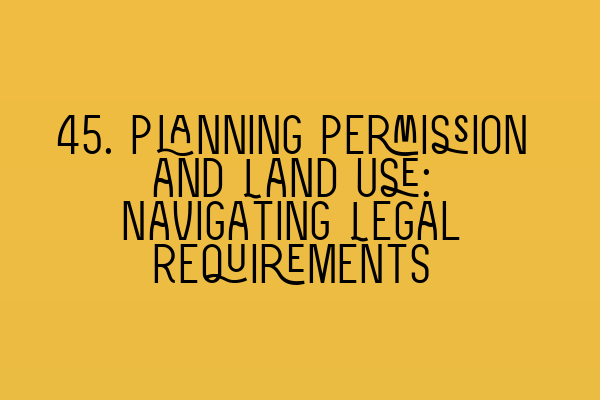Planning Permission and Land Use: Navigating Legal Requirements
When it comes to property development and land use, navigating the legal requirements can be a daunting task. One crucial aspect of this process is obtaining planning permission. Planning permission is the approval required from the local planning authority for certain types of development or change of land use.
Whether you are a property developer, a homeowner looking to extend your property, or a business owner planning to build new premises, understanding the intricacies of planning permission is essential to ensure compliance with the law.
Why is Planning Permission Important?
Planning permission plays a critical role in regulating how land and property are developed and used. It helps maintain the balance between the needs of communities and the interests of property owners and developers. Obtaining planning permission ensures that any proposed development is suitable for its intended purpose, meets environmental standards, and does not negatively impact the surrounding area or its residents.
Without planning permission, you may face legal consequences, such as fines, enforcement orders, or even having to demolish the development if it doesn’t comply with planning regulations. Therefore, it is crucial to navigate the legal requirements surrounding land use and planning permission diligently.
The Planning Permission Process
The process of obtaining planning permission can be complex, involving several stages and considerations. Let’s take a closer look at each step:
1. Prepare and Submit an Application
The first step is to prepare a comprehensive planning application. This includes gathering all necessary documentation, such as site plans, floor plans, elevations, and supporting documents like environmental impact assessments (EIAs), transport assessments, and heritage statements, depending on the nature of the development. It’s important to ensure that the application is complete and accurately reflects your plans.
Once your application is complete, it needs to be submitted to the relevant local planning authority. You may also need to pay an application fee, which varies depending on the size and complexity of the development.
2. Local Planning Authority Review
Once your application is submitted, the local planning authority will review it and assess its compliance with local and national planning policies. They will also consider any objections or concerns raised by local residents or other interested parties. This stage may involve consultations with various specialists, such as environmental experts or heritage officers, depending on the nature of your proposed development.
The review process can sometimes take several weeks or months, depending on the complexity of the application and the workload of the planning authority.
3. Decision and Determination
After the review process, the planning authority will make a decision regarding your planning application. The decision can fall into three categories:
- Approved: Your application has been granted planning permission, either outright or subject to certain conditions.
- Refused: Your application has been rejected.
- Deferred: The planning authority requires more information or modifications before making a decision.
If your application is approved, you can proceed with the proposed development. However, if it is refused or deferred, you may have the option to appeal the decision or resubmit an amended application to address the planning authority’s concerns.
Expert Support for Navigating Planning Permission
Navigating the planning permission process can be overwhelming, especially if you are not familiar with the legal requirements and complexities involved. That’s where SQE Property Law & Land Law can provide valuable assistance.
As solicitors specializing in property law, we have extensive experience in helping clients obtain planning permission for a wide range of developments. Our team of experts can guide you through the entire process, from preparing a thorough and persuasive planning application to representing you in appeals or resubmission if necessary.
With our in-depth knowledge of planning law and regulations, we can help you navigate the complexities and potential pitfalls, ensuring that your development aligns with legal requirements while also meeting your objectives. Whether you are a property developer, homeowner, or business owner, our expertise can help you achieve your goals efficiently and successfully.
If you are seeking professional advice or need assistance with planning permission and land use matters, please contact us for a consultation. Our team of experts is ready to provide tailored solutions and help you navigate the legal landscape with confidence.
Related Articles:
